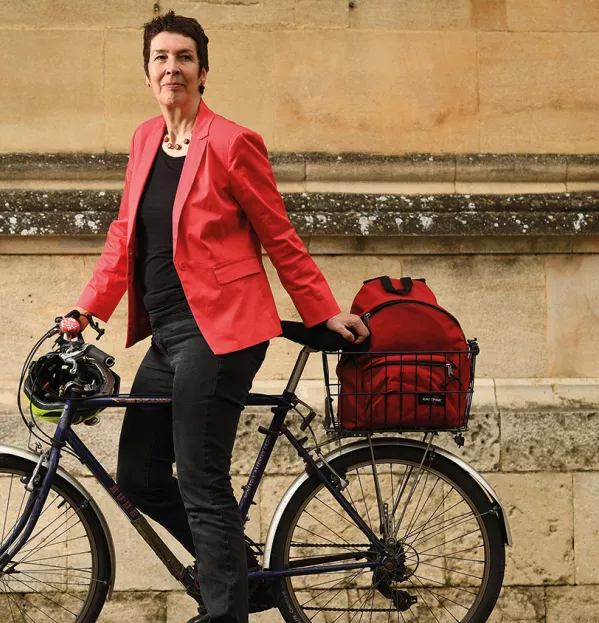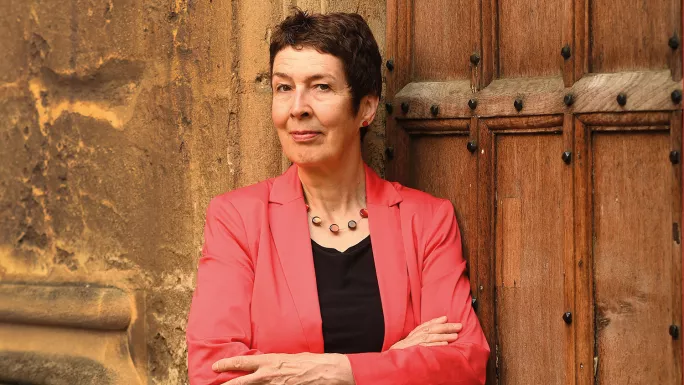Tes talks to...Katrin Kohl

Monolingualism is the norm, right? Most of us don’t get beyond school-level French or German - those who do are the minority, and that’s just how it is. Wrong, says Katrin Kohl, a University of Oxford professor of German literature who has sat on the A-level content advisory board for modern foreign languages. Only in anglicised societies, Kohl argues, is monolingualism perceived as normal.
“It’s entirely normal for humans to speak more than one language; we do it all the time with different registers when we’re talking to a grandparent, the boss, the dog. We’re constantly switching, so we’ve got that flexibility,” she says.
Kohl is currently heading up a four-year research project called Creative Multilingualism that aims to reinvigorate modern foreign language research and MFL learning in schools. Funded by the Arts and Humanities Research Council, the project began in 2016 and involves a consortium of six universities, led by the University of Oxford and also including Birmingham City University, the University of Cambridge, the University of Reading, SOAS University of London and the University of Pittsburgh in the US.
That modern foreign languages are suffering in schools is clear from the statistics for GCSE exam participation. The British Council points out that there was an overall drop of 7.3 per cent in the number of modern foreign language exams taken in 2017. It calculates that overall MFL entries have almost halved in number over the past two decades. Part of the role of the Creative Multilingualism team is to find out why this has happened and attempt to find a solution.

One problem is the assumption that monolingualism is the natural human state, but there are other issues, says Kohl. These include teacher shortages and poor perception of languages, but also a lack of appreciation for what learning a language offers. “We think that what has got lost is an understanding of the value of language as something that makes us human, something that is related to our imagination, our cultural intelligence, our ability to engage in culturally rich ways with other people. By enhancing our language capabilities, we make ourselves more creative,” she says.
One strand of Kohl’s research is the Multilingual Performance Project, which aims to boost language teachers’ confidence in conducting creative work in school, increasing awareness of the creative dimension of languages, and ramping up enthusiasm for learning them.
The project involves schools teaming up with local theatres for different forms of performance, including short sketches, play readings and news broadcasts.
Theatres already signed up include the Birmingham Repertory Theatre and the Oxford Playhouse.
Performance and MFL
Kohl and colleagues have produced a downloadable starter pack for teachers (bit.ly/CMLstarter), which includes exercises that can be incorporated into lessons.
“We’re keen to give teachers something concrete that allows them to engage with the research we’re doing. We felt that performance was something that would benefit modern languages teachers and also draw in other languages beyond what is being taught, so that it becomes a space for exploring how languages interact, for children to be able to use a foreign language expressively, without needing to be fluent in it,” she says.
Another strand, Linguistic Creativity in Language Learning, is undertaking empirical research on schools, comparing the effectiveness of different approaches to language learning.
“The researchers are working with groups of language learners in a range of schools and comparing how they respond to functional teaching approaches compared with approaches that involve creative personal responses, such as drama and creative writing. The project is also looking at how learners see language learning and what motivates them to learn. We’ll publish results on our website [bit.ly/creativeML] as they emerge,” says Kohl.
What does she think needs to change based on her early findings and experience in this field? Kohl would like to see learning made more relevant to students’ everyday experience and environment.
“Modern languages have more traditionally been seen as something you do so that you can go to France, Spain or Germany and speak with the natives. But, thanks to the globalisation of English, that’s not particularly appropriate to the 21st century,” she explains. “Yes, it’s one rewarding experience of speaking another language, but if we see it as the only purpose, we risk suggesting that language is now irrelevant because people in those other countries can speak English.
“There needs to be more involvement of the individual to make them interested in the foreign language that is relevant to them in their personal environment rather than some abstract, foreign environment which, increasingly, they’re not getting the opportunity to experience - [there are fewer school trips] because they’re so difficult to organise due to safeguarding requirements.”
‘Long-term process’
Kohl says another rich source of possibility would be to draw on other languages that are spoken by pupils in the classroom besides the one they are learning. “It’s a hugely valuable resource and learning a language shouldn’t be about creating a silo of ‘Little France or Spain’. And don’t completely exclude English either - that’s part of children’s experience of language,” she says.
She points to 2017 figures that show a third of all students in Oxford - that’s 5,640 pupils - have a first language other than English, with Urdu being the second most commonly spoken language.
And as for outcomes, there should not be so much focus and emphasis on fluency, she argues. “Kids are promised that if they learn a language they will become fluent, which doesn’t really happen. There is no quick fix - learning a language is a long-term process that needs a huge amount of practice, if you think about how many hours we spend learning English from birth,” she says.
Yet Kohl stresses that she does not wish to knock the aim of fluency, rather she wants to change the perception of how it can be achieved. “I think one does want to become fluent - the more fluent you are in a language the better. What we’re saying is build it up gradually from small building blocks, enabling children to develop fluency from within their own language resources rather than giving them ready-to-learn chunks that they can regurgitate. It’s better to work with a little and build on that slowly to gain confidence, rather than rushing ahead to reach pseudo fluency,” she says.
But these changes cannot happen, she argues, unless the assessment criteria change, too. “I think often in assessment, the criteria suggest that a level of competence is realistic at GCSE level that actually isn’t and this has led to significant distortion of the results.
“I’m in a working group with Ofqual about this and I think we need to have more conversations with exam boards as well. In every cohort there are native speakers and they will often drive what is seen to be achievable, whereas actually some of the kids coming from an English native-speaking background don’t reach the level expected. So the near native speakers are giving an illusion of what can be achieved by GCSE.
“To that end, grading is too severe. The criteria for what’s expected at GCSE level should be made more modest so teachers can spend more time focusing on teaching the grammar and vocabulary more thoroughly.”
Overall, Kohl stresses the need to go back to basics with language teaching. “It’s about learning the deep structures of a language, the grammar and vocabulary so that students can use a language creatively and make it part of their own repertoire,” she argues. “Connect it up with what they already know. I think that’s where things have gone too far in the direction of giving learners ready-made chunks they can use.”
It’s about language learning as empowerment, not regurgitation, she concludes. “You get the phrase for ordering a plate of chips in Italy rather than understanding the structure with which you can construct your own sentence.”
Christina Quaine is a freelance journalist
You need a Tes subscription to read this article
Subscribe now to read this article and get other subscriber-only content:
- Unlimited access to all Tes magazine content
- Exclusive subscriber-only stories
- Award-winning email newsletters
Already a subscriber? Log in
You need a subscription to read this article
Subscribe now to read this article and get other subscriber-only content, including:
- Unlimited access to all Tes magazine content
- Exclusive subscriber-only stories
- Award-winning email newsletters